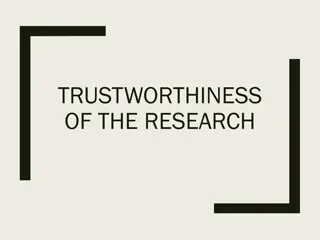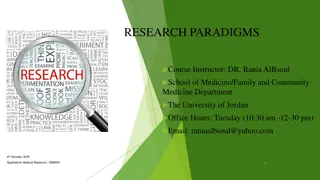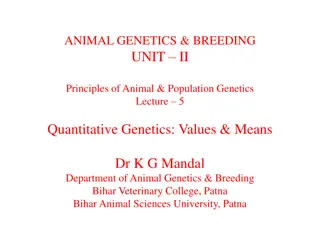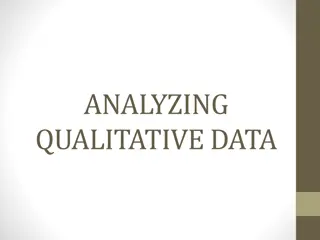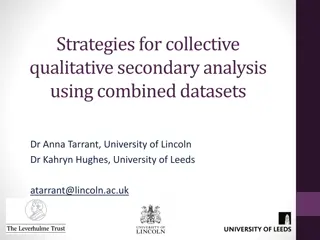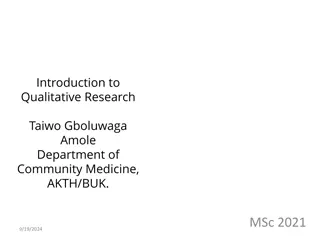
Qualitative Research Strategies and Techniques
Explore the world of qualitative research through the eyes of CK Farn from CYCU. Learn about the importance of qualitative research, data collection techniques, sources of data, and the distinction between qualitative and quantitative methods. Understand how to formulate research questions and choose the appropriate research strategy for your study. Delve into the various types of empirical research to enhance your understanding of this valuable research approach.
Download Presentation

Please find below an Image/Link to download the presentation.
The content on the website is provided AS IS for your information and personal use only. It may not be sold, licensed, or shared on other websites without obtaining consent from the author. If you encounter any issues during the download, it is possible that the publisher has removed the file from their server.
You are allowed to download the files provided on this website for personal or commercial use, subject to the condition that they are used lawfully. All files are the property of their respective owners.
The content on the website is provided AS IS for your information and personal use only. It may not be sold, licensed, or shared on other websites without obtaining consent from the author.
E N D
Presentation Transcript
12 Qualitative Research 1 / Department of Information Management CYCU CK Farn mailto: ckfarn@gmail.com 2023.12 CK Farn, CYCU 1
Qualitative research The researcher himself acts as the instrument of research Through interviews, observations, document analysis, etc., to obtain further understanding through the interpretation of data CK Farn, CYCU 2
Why Use Qualitative Research? Most of what influences what we say and do occurs below the level of awareness. That s why we need new techniques: to get at hidden knowledge to get at what people don t know they know. Jerry Zaltman CK Farn, CYCU 3
Qualitative Research Group Interviews Focus Groups Observation IDIs Data Collection Techniques Ethnography Case Studies Grounded Theory Action Research CK Farn, CYCU 4
Qualitative Research Textual Analysis Behavioral Observations Artifacts Other Techniques Trace Evidence Debriefings CK Farn, CYCU 5
Data Sources People Organizations Texts Environments Artifacts/ media products Events and happenings CK Farn, CYCU 6
Distinction between Qualitative & Quantitative Theory Building Theory Testing CK Farn, CYCU 7
Understanding the research question Research question What is my study about? Form Am I asking a who, what, where, why, or how question? The form of the research question provides hints on choosing the appropriate research strategy CK Farn, CYCU 8
Choice of research strategy First step: Definition of the research question Determine the type of research question In general what ( ): exploratory ( ) how ( ), why ( ): confirmatory ( ) CK Farn, CYCU 9
Types of Empirical research By stage of research Exploratory hypothesis building Confirmatory hypothesis testing By data collection approach Qualitative Research Case study, observation, participant observation, ethnography Quantitative Research Experimentation, survey, content analysis CK Farn, CYCU 10
Empirical research types There is a high association between exploratory research and qualitative research Sense making in exploratory research: the process by which people give meaning to their collective experiences, or to the insights derived from the data collected CK Farn, CYCU 11
Explore: Formation of Constructs Conceptual Level X Y Inference: Causal relationship Abstraction, Conceptualization y x Analysis: Association Observation Observation Operational Level 12
The Roots of Qualitative Research Qualitative Research Economics Psychology Sociology Semiotics Anthropology Communication CK Farn, CYCU 13
Research philosophy in social science Positivism Comte ( ) the only authentic knowledge is that which is based on sense experience and positive verification. Interpretivism or Anti- positivism/Hermeneutics Max Weber ( ) Hegel ( ): dialectics The study of the interpretation of written texts (also, verbal and nonverbal forms of communication) Non-positivist research is usually qualitative, while positivist research is more quantitative. Interactionism Meaning is produced through the interactions of individuals. CK Farn, CYCU 14
Types of qualitative research Biography Study of an individual, as well as the experience he states Phenomenology Study of many individuals, as well as the experience they state Grounded Theory Sociology: For a specific situation, try to deduce a theory from a phenomenon Ethnography Anthropology: Descriptions and interpretations of a culture CK Farn, CYCU 15
Types of qualitative research 2 Case study Descriptions and interpretations of one or more objects Using multiple data collection approaches Action research Organizational development: The researcher participates in the action to plan, implement, and monitor the change of the action, and uses the researcher's theory and experience to serve the research object Historical research Explain the connections between events CK Farn, CYCU 16
Qualitative research process Data collection Data reduction Data display Conclusion drawing and Verification Triangulation CK Farn, CYCU 17
Data collection in qualitative research Secondary data, documents Observation Interviews CK Farn, CYCU 18
Methodological Triangulation using multiple datasets, methods, theories, and/or investigators to address a research question help to enhance the validity and credibility of findings and mitigate the presence of any research biases mainly used in qualitative research triangulation. CK Farn, CYCU 19
Focus of Research Qualitative Understanding Interpretation Quantitative Description Explanation CK Farn, CYCU 20
Researcher Involvement Qualitative High Participation-based Quantitative Limited Controlled CK Farn, CYCU 21
Research Design Qualitative Longitudinal Multi-method Quantitative Cross-sectional or longitudinal Single method CK Farn, CYCU 22
Sample Design and Size Qualitative Non-probability Purposive Small sample Quantitative Probability Large sample CK Farn, CYCU 23
Data Type and Preparation Qualitative Verbal or pictorial Reduced to verbal codes Quantitative Verbal descriptions Reduced to numeric codes CK Farn, CYCU 24
Turnaround Qualitative Shorter turnaround possible Long elapse time Insight development ongoing Quantitative May be time-consuming (for a sample) Short elapse time Insight development follows data entry CK Farn, CYCU 25
Data Analysis Qualitative Nonquantitative; human Judgment mixed with fact Emphasis on themes Quantitative Computerized analysis Facts distinguished Emphasis on counts CK Farn, CYCU 26









